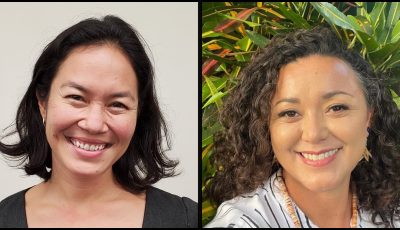‘CNMI ranks among lowest in nation on LGBTQ+ protections’
Lawmaker acknowledges that the CNMI has done remarkable job so far against COVID-19
The CNMI ranks among the lowest in the nation in terms of policies in place that provide protections for LGBTQ+ residents against discrimination and in the areas of health insurance, employment and the workplace, and housing, according to House Committee on Health and Welfare chair Rep. Christina Sablan (D-Saipan).
“We can and should change that,” said Sablan in her opening statement during the committee’s first public hearing last Friday at the House’s chamber.
Advancing the equality and wellbeing of the LGBTQ+ community in the CNMI was among the five issues that, according to Sablan, are key priorities that the 22nd House leadership has identified that fall squarely within the committee’s jurisdiction.
LGBTQ+ stands for lesbian, gay, bisexual, transgender, queer (or sometimes questioning), and others. The plus represents other sexual identities.
Sablan also asked committee members to support the reintroduction and passage of the Commonwealth’s first Hate Crimes bill that Rep. Donald Manglona (Ind-Rota) originally introduced in the 21st Legislature. She urged committee members to work with their colleagues in the 22nd Legislature and community partners to see the bill through to enactment.
Sablan said the primary goal of Friday’s meeting is to lay out the committee’s legislative agenda and its priorities for calendar year 2021, and to open the discussion with their partners and constituents and accept their feedback.
The committee’s four other priorities are to monitor the CNMI’s COVID-19 response and efforts to protect the health and welfare of the community, to expand access to health care in the Marianas, to reform the medical referral program, and to raise revenue of health care and increase investments in the CNMI’s health care system.
She acknowledged that, on the whole, the Commonwealth has done a remarkable job thus far in keeping the worst impacts of the pandemic at bay. She thanked the leadership of the Commonwealth Healthcare Corp. and the Governor’s COVID-19 Task Force, as well as the cooperation of the community.
Sablan said Delegate Gregorio Kilili C. Sablan (Ind-MP) also did a tremendous work in securing hundreds of millions of federal dollars for health care, testing, vaccinations, unemployment assistance, food aid, emergency housing assistance, and more.
Sablan said other House committees have expressed an interest in reviewing the management and expenditures of all funds, both federal and local, going to support the Commonwealth’s COVID-19 response. She said her committee has a role to play to ensure that funds are monitored closely and that benefits are reaching the people who need them, particularly through the Commonwealth’s health and social welfare programs.
On expanding access to health care, Sablan said Public Law 21-35, the Appropriations Act of Fiscal Year 2021, directs the Commonwealth Healthcare Corp. to report to the Legislature by March this year on policy options to expanding access to care to reach the CNMI’s goal of universal coverage in the Marianas. She said one major avenue for expanding access to care was made possible in another recently enacted law, Public Law 21-28, which authorizes the Medicaid Agency to offer a buy-in program to residents who currently lack health insurance and would not otherwise qualify for regular Medicaid. She said they will be inviting the Medicaid Office to brief the committee members on this and other areas of the program, and how they can be of support.
On reforming the medical referral program, Sablan said the CNMI government exceeds in the millions of dollars every year its appropriated budget for off-island medical referral. In 2020 alone, the CNMI spent over $11.6 million on off-island medical referral, she said, yet only a little over $1 million had been allotted for the year.
Sablan said her committee will work with CHCC, the Torres-Palacios administration, the Medical Referral Office, and other policy experts to review the program, and identify areas where services could be improved or offered on-island or through telemedicine, and where savings might be realized.
“We also must be involved in monitoring the proposed transition of the program out of the Governor’s Office to the CHCC, and developing legislation to establish parameters for off-island referrals,” she said.
Rep. Leila Staffler (D-Saipan) is the committee’s vice chairperson, and members are Reps. Sheila Babauta (D-Saipan), Manglona, and Blas Jonathan Tenorio Attao (R-Saipan).
CHCC Esther Muña and her team testified at the meeting.



























